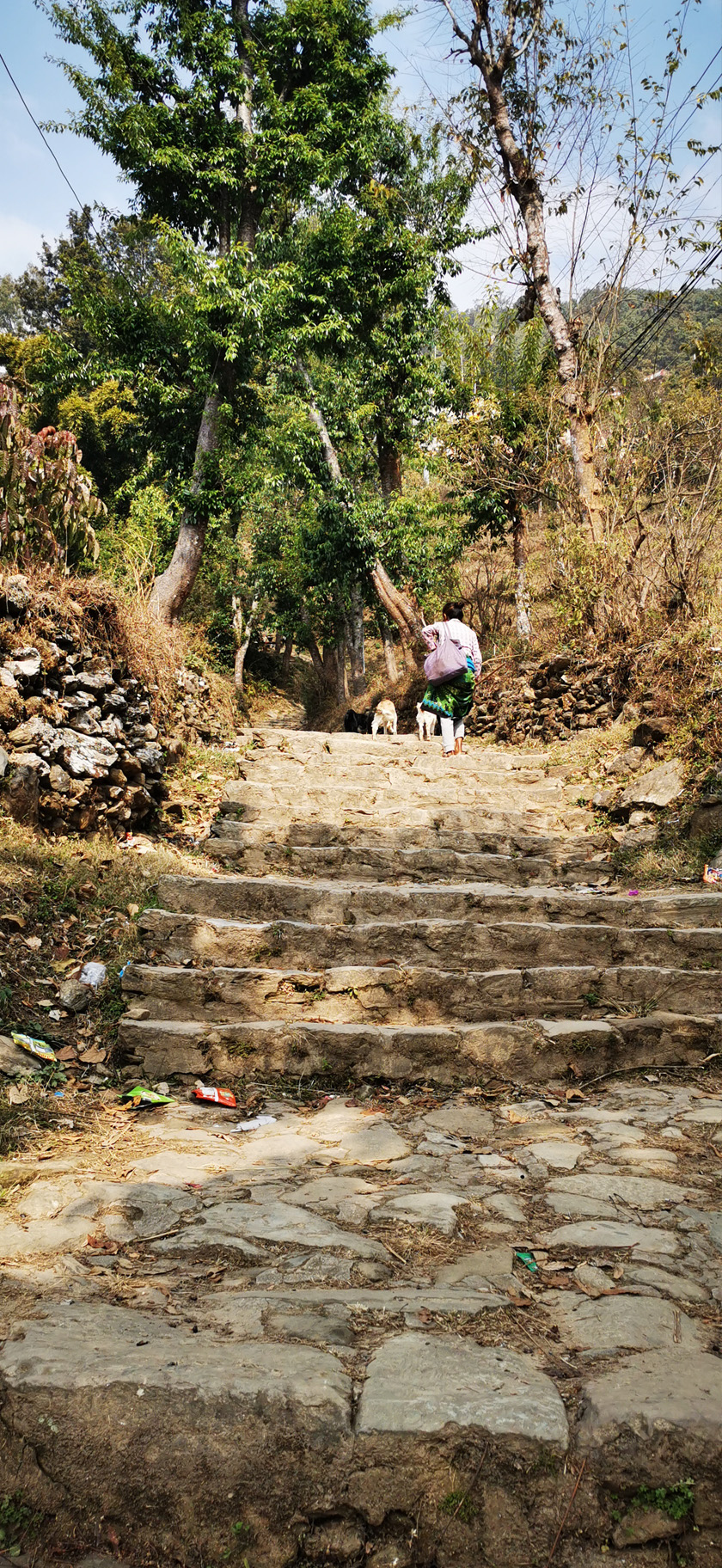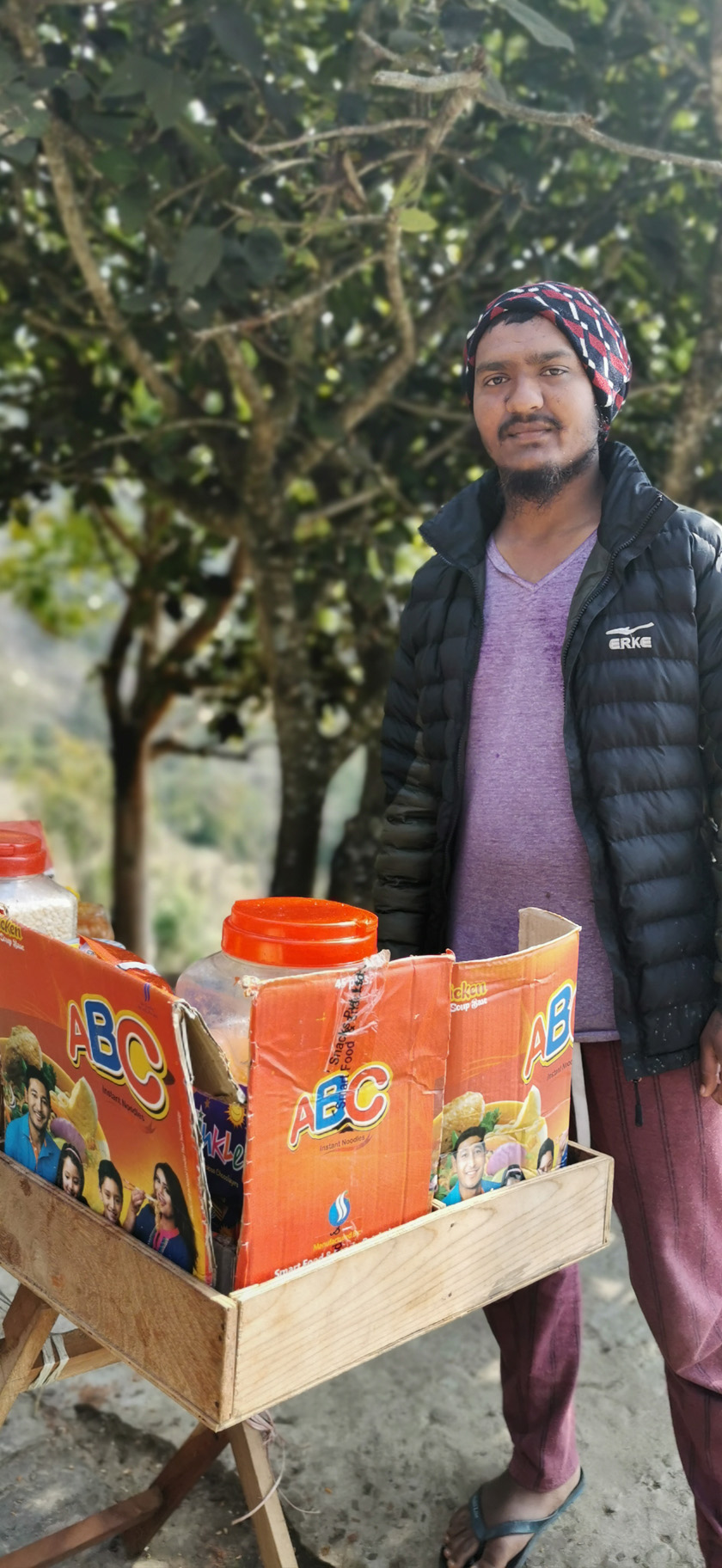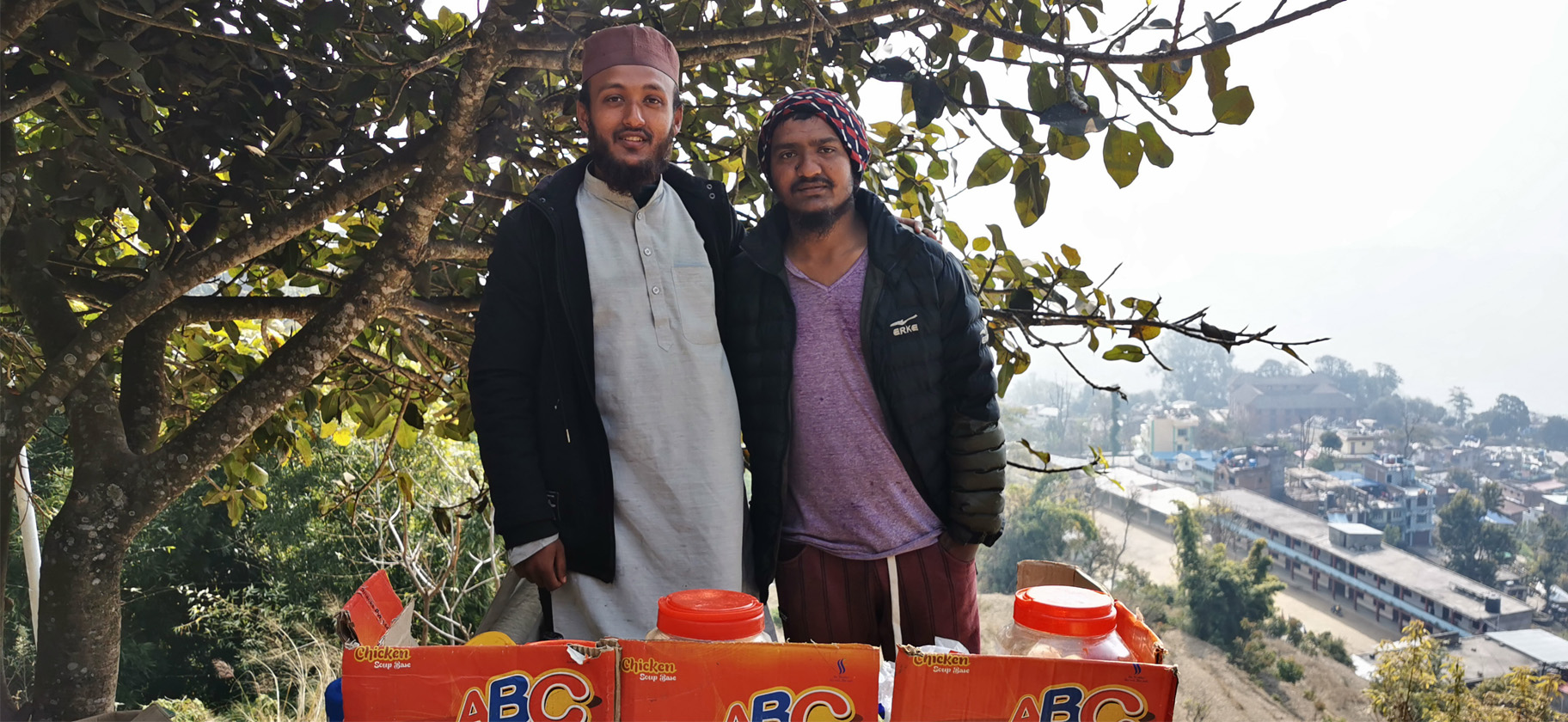Omar’s Pani-Puri Cart in Gorkha

Located halfway between Pokhara and Kathmandu along the main highway that winds its way through the valley along the foothills of the Himalayas, the village of Gorkha sits nestled in the clouds along a route headed north toward the Manaslu peak. It is a village that is built along a slope with its Hindu Kalika temple at the very top overlooking the forest and the village below. Getting to the temple requires some stamina and it is still in use which means that tourists are not exactly encouraged to visit. The term ‘in use’, here, means that it remains a place of ritual sacrifice for practicing Hindus who will make their pilgrimage with a goat or a chicken as an offering to their deities. It is a place for devout Hindus willing to make the trek and wait for long hours to meet with the high priest who will lead their offering into the temple where the sacrifice is made.  There are several roads and footpaths which hug the slope of the hill that one can follow to make their way to the top, but there is also a series of over 1500 stone steps leading down one side of the hill which links the temple directly with the town below. It was along these steps that I happened upon Omar and his Pani-puri cart.
There are several roads and footpaths which hug the slope of the hill that one can follow to make their way to the top, but there is also a series of over 1500 stone steps leading down one side of the hill which links the temple directly with the town below. It was along these steps that I happened upon Omar and his Pani-puri cart.
Pani-puri is a popular Indian snack made of a variety of dried nuts and other legumes along with broken bits of dried noodles and mixed with various spices and chillies and served with a healthy helping of tart lime juice. It is similar to Chat-pat, but, with pani-puri, the server will take a series of crispy puffed rice crackers and punch a hole in each one turning them into small spoon-sized bowls. Each puff is then filled with the spicy legume mixture and the crunchy snack is complete. One serving is about 8 to 10 filled puffs and usually costs about a dollar or two.
Omar and his brother, Zoheb, were minority Muslims and running the cart was a way for them to make a little bit of money in a place where work was otherwise difficult to find. They spoke a bit of English and were delighted by my arrival as I was the only person not native to the village who had passed by in many months. Tourism had taken a real hit over the last five years since the earthquake that had struck nearby in April of 2015. Like so many, their homes had been destroyed but they were proud of all of the progress they and the rest of the village had made as it continued to rebuild. A new tourism campaign to visit Nepal in 2020 was just kicking off and they were optimistic that tourism would return to the region.
I started off simply curious about his cart and not sure if I wanted a snack, but they were so kind and inquisitive that this was as fine a place as any to part with fifty rupees. Their hospitality knew no bounds. There was a makeshift shelter nearby which would be a short reprieve from the heat of the sun and since they had my attention I took advantage of the opportunity to rest for a while. There was a small wooden bench where they told me to wait as Omar prepared my pani-puri. I was more thirsty in the hot sun than I was hungry and Zoheb went to fetch me a bottle of water. They were instantly curious about my beard and asked how long it had been growing. As we spoke, they stroked their own beards with a simultaneous sense of pride and envy. Even more than how long my beard had grown, both admitted that what made it most impressive was just how thick it had grown. I discovered that I was several years older than they both were so my advice was simply to give it time.
Both Omar and Zoheb were keen to hear about what life was like in Canada.
Do you have mountains? they asked pointing to the line of hills barely visible in the thick cloud.
I explained that Canada is so vast that we were blessed to have every manner of topography from low-lying valleys, vast empty plains, great lakes, and, of course, mountains too.
They told me, as every resident native to Nepal was quick to do, about their friends who had moved to or visited Canada and about the wonderful things that they had heard. They looked off into the distant thick sheet of clouds with longing and saying that one day they would travel to Canada and set up a tech business. They were convinced that they possessed the knowledge and skills to start up such a company and that a place like Toronto or Calgary, or whatever other Canadian cities that they could name, had the ideal infrastructure for it to be successful.
 When Omar served me my pani-puri, Zoheb went bounding up the steps and returned a few moments later with a small metal dish which he gave to me. It was filled with kheer. Kheer is a rice pudding that is soft and creamy and sweet and flavoured with notes of rosewater and cinnamon, sometimes with raisins, softened cardamom pods or cooked chunks of coconut thrown in. In short, it is in food terms the exact opposite of pani-puri. It was not exactly on offer as part of the menu from Omar’s cart, but as they lived just nearby and Zoheb knew that his mother had made a large pot and he said it was no bother and insisted that I try some.
When Omar served me my pani-puri, Zoheb went bounding up the steps and returned a few moments later with a small metal dish which he gave to me. It was filled with kheer. Kheer is a rice pudding that is soft and creamy and sweet and flavoured with notes of rosewater and cinnamon, sometimes with raisins, softened cardamom pods or cooked chunks of coconut thrown in. In short, it is in food terms the exact opposite of pani-puri. It was not exactly on offer as part of the menu from Omar’s cart, but as they lived just nearby and Zoheb knew that his mother had made a large pot and he said it was no bother and insisted that I try some.
Pani-puri is characterized by so many extremes hitting your mouth all at once. It is an absolute barrage of flavours. It is salty and sour and, depending on how many chillies you have asked the server to include, fiery hot. Nothing about the spicing is subtle and by the end, it can leave your tongue feeling numb. The combination of the crispy rice puff and the crunch from the assorted nuts and legumes offers a tantalizing mouthfeel that, like most salty treats, gives it that addictive snack quality that keeps you constantly reaching for the next bite.
Kheer, on the other hand, is incredibly smooth and subtle. Rice au naturel is one of the blandest staples around and mixed with cream and then chilled it provides the perfect counterweight to the assault of spices from the pani-puri. It is lightly sweetened, but that sweetness is enhanced by that contrast that the tongue has now become accustomed to from the pani-puri and the result is that one’s hot tongue seems to melt the cool kheer in the mouth.
Omar and Zoheb sat with me as I ate and when they learned about my nomadic lifestyle they were curious about the other countries I had visited, but they seemed most curious about the other places I had visited in Nepal and what my impressions were of other cities and villages. For a moment, it seemed as though they were pushing me in the direction of revealing that Gorkha was paradise on Earth and, though I had no reason to suggest that their city was less appealing than any other, I could not offer them the satisfaction of feeling as though Gorkha was superior to any other. I concentrated on sharing the things I did already love about Gorkha and speculated on just how beautiful it could be if you could see the mountains. I don’t know why I couldn’t give in and let it slip that Gorkha was the most beautiful place that I had ever seen in my life just to satisfy them. It would have only brought them joy and I felt ashamed about my unyielding tendency to always bend toward the truest truths and that I could not bring myself to tell them the whitest of lies.
As I reached for my wallet, Zoheb put his hands up and insisted that all of these treats were on the house. I looked over at Omar and joked that it was his cart and that he should not let his brother make these kinds of economic decisions. He simply giggled. Between the pani-puri, the kheer and the bottle of water, the lot of it could not have cost more than five dollars and I pushed back with my own insistence that I pay them.
Sir, Zoheb said, you have brought us such joy today just by walking these steps.
de Ko, I replied. Call me de Ko.
We shook hands and I told them that if they would not accept my money that I would make sure that I told everyone I knew about Omar’s pani-puri cart in Gorkha.
I like your story, I told them both. I am a simple man, but I will tell everyone I meet to one day go to Gorkha and ascend the mountain and stop in for a serving of pani-puri at Omar’s cart.
And with that, I continued my descent back into town before finally stopping myself and turning back to remind them: If anybody else comes, though, and if they say that I sent them, make sure that you actually charge them for the pani-puri or else you’ll just end up losing money!
